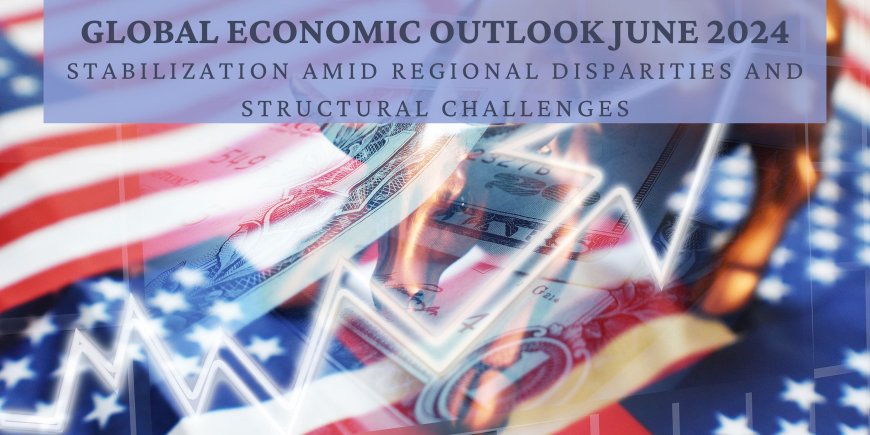Global Economic Outlook June 2024: Stabilization Amid Regional Disparities and Structural Challenges
Discover the latest insights on the global economy for June 2024. Learn about growth projections, regional outlooks, inflation trends, and policy recommendations for sustainable recovery and resilience against geopolitical and environmental risks.

Global Growth and Stability
The global economy in 2024 is experiencing a phase of stabilization after several tumultuous years. According to the World Bank, global growth is expected to hold steady at 2.6% this year and edge up slightly to 2.7% in 2025-26. This rate is lower than the pre-COVID decade average of 3.1%, indicating a more cautious recovery path for most of the world's economies. The growth projection highlights that over 80% of the global population and GDP will grow more slowly than in the pre-pandemic period (World Bank) (World Bank).
Regional Economic Outlooks
South Asia: The region's growth is set to slow from 6.6% in 2023 to 6.2% in 2024, primarily due to a moderation in India's growth. Despite this slowdown, robust growth is anticipated in Bangladesh, and economic strengthening is expected in Pakistan and Sri Lanka. However, risks such as commodity market disruptions, fiscal consolidations, financial instability, extreme weather events, and slower growth in China and Europe pose significant challenges (World Bank).
Sub-Saharan Africa: Growth in this region is projected to increase to 3.5% in 2024 and average around 4% in 2025-26. This improvement is driven by declining inflation and better private consumption and investment. Nonetheless, political instability and conflict continue to pose risks, and the region's progress in poverty alleviation remains insufficient due to increasing debt-service costs and narrowed fiscal space (World Bank).
Advanced Economies: Growth in advanced economies is expected to improve slightly from 1.6% in 2023 to 1.7% in 2024 and 1.8% in 2025. The overall resilience of these economies is noteworthy despite significant central bank interest rate hikes aimed at restoring price stability (IMF).
Inflation and Monetary Policy
Global inflation is forecasted to decline steadily from 6.8% in 2023 to 5.9% in 2024, and further to 4.5% in 2025. Advanced economies are likely to reach their inflation targets sooner than emerging markets and developing economies. The gradual decline in core inflation reflects ongoing efforts by central banks to stabilize prices (IMF).
Structural Challenges and Policy Recommendations
The International Monetary Fund (IMF) highlights persistent structural frictions preventing efficient capital and labor allocation as a significant constraint on global growth. To address these challenges, enhancing supply-side reforms and promoting multilateral cooperation are critical. Policies focused on fiscal consolidation, investment in public infrastructure, and green energy transition are essential for sustainable growth and resilience against future shocks (IMF).
Investment and Development Goals
The World Bank emphasizes the importance of accelerating investment in emerging markets and developing economies (EMDEs). Public investment, which averages about one-quarter of total investment in these regions, plays a crucial role in boosting growth, productivity, and poverty reduction. Policy reforms to improve public investment efficiency and create fiscal space through revenue and expenditure measures are necessary to reverse the trend of sluggish investment growth(World Bank).
Geopolitical and Environmental Risks
The global economic outlook is fraught with risks, including geopolitical tensions, particularly in the Middle East, political instability, economic slowdown in major economies like China, and the increasing frequency of extreme weather events. Addressing these risks requires coordinated global efforts and robust policy frameworks to enhance economic resilience and stability (World Bank) (World Bank).
In summary, while the global economy shows signs of stabilization, the path to robust growth remains uneven across regions. Strategic investments, fiscal reforms, and international cooperation will be vital in navigating the complex landscape of economic recovery and growth in the coming years.

 LD Web Desk
LD Web Desk 